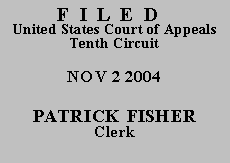

| UNITED STATES OF AMERICA,
v.
DANIEL JOE PRICE |
No. 04-7031
(D.C. No. 03-CV-520-P) |
BACKGROUND
On October 18, 2000, the government charged Defendant with a six count indictment alleging three firearms violations and three counts of assaulting or impeding a federal officer. Defendant originally pleaded not guilty, and the case proceeded to trial on April 2, 2001. Two-and-one-half weeks into the trial, however, Defendant decided to enter into a plea agreement whereby he would plead guilty to two counts of the indictment (felon in possession of a firearm and assaulting a federal officer) in exchange for a 10-year sentence. In addition, the government agreed to dismiss all other charges in the indictment, and Defendant agreed to waive his right to direct appeal and collateral attack on the conviction.
After a lengthy hearing, the district court found Defendant's actions to be voluntary and accepted the plea. In accordance with the agreement, the court sentenced Defendant to 10 years in prison followed by three years of supervised release for each count, with the sentences to run concurrently. In addition, Defendant was fined a special assessment of $100.00 for each count.
Defendant then filed a direct appeal to this court, in which his attorney filed an Anders brief. Defendant's pro se brief, however, raised several non-jurisdictional issues and alleged antecedent constitutional defects, including suppression of the fruits of an alleged illegal search warrant, insufficiency of the evidence, and a violation of Rule 5 of the Federal Rules of Criminal Procedure (initial appearance before a magistrate). United States v. Price, 50 Fed. Appx. 968, 969 (10th Cir. 2002). We found that by entering an unconditional guilty plea, Defendant waived his right to raise these issues on appeal. Id. Defendant also contended that one of the statutes under which he was convicted, 18 U.S.C. § 922(g), was facially unconstitutional, a claim which we also rejected. Id. Finding no other non-frivolous grounds for appeal in the record, we dismissed the case. Id. In addition we found "nothing in the record to indicate that Mr. Price's guilty plea was not knowing and voluntary." Id.
Defendant then filed a § 2255 motion with the district court, in which his sole ground for relief was ineffective assistance of counsel in connection with his decision to enter into a guilty plea. Defendant did not contend that his plea was involuntary, but rather argued that "had it not been for counsel's errors during the trial, he would not have had to take counsel's advice . . . and pleaded [sic] guilty." (R.O.A. at Tab 1.) Specifically, Defendant complained about counsel's (1) failure to call a particular corroborating witness; (2) failure to have photographs examined by an expert; (3) failure to raise a Brady violation; (4) improper raising of a search warrant issue; and (5) failure to challenge the court's jurisdiction.
The district court did not reach the merits of Defendant's motion, holding instead that Defendant had explicitly waived any right to collateral attack on the sentence as part of his plea agreement. The court noted that it found nothing in the record to indicate that Defendant's plea (and therefore the waiver of collateral relief) was not knowing and voluntary. As a result, the court denied Defendant's § 2255 motion, his application for a COA, and his motion to proceed in forma pauperis.
DISCUSSION
In the instant case, Defendant seeks a COA from this court because the district court denied his request to appeal its decision. See Fed. R. App. P. 22(b)(1). To prevail, Defendant must make "a substantial showing of the denial of a constitutional right." 28 U.S.C. § 2253(c)(2) (2000). This is accomplished by establishing that "reasonable jurists could debate whether (or, for that matter, agree that) the petition should have been resolved in a different manner or that the issues presented were adequate to deserve encouragement to proceed further." Slack v. McDaniel, 529 U.S. 473, 483-484 (2000) (quotations omitted).
Defendant concedes that his motion does not challenge the voluntariness of his plea. Rather, his argument is that even a voluntary plea may nevertheless be invalid if it is motivated by previous instances of ineffective assistance of counsel. The Tenth Circuit addressed this very situation three years ago in United States v. Cockerham, 237 F.3d 1179 (10th Cir. 2001). In Cockerham, we held that a waiver of § 2255 rights will be enforced when the collateral attack does not challenge counsel's representation in negotiating or entering the plea or the waiver. Id. at 1187.
In the instant case, none of the alleged errors Defendant cites pertain to plea negotiations. Rather, Defendant argues that counsel's poor previous trial performance put him in a position in which a plea was simply the best option. Under Cockerham, this is not the sort of argument which survives a waiver of post-conviction rights. See Id. at 1187-1191. Thus, we are not convinced that reasonable jurists could debate that Defendant's motion should have been resolved differently. See Slack, 529 U.S. 483-484.
Accordingly, we DENY COA and DISMISS the appeal. Defendant's pending Motion to Reconsider is also DENIED for the reasons stated in our earlier order, filed August 13, 2004.
ENTERED FOR THE COURT
David M. Ebel
Circuit Judge
*.Based on our review of Defendant's financial declarations, we grant his motion to proceed in forma pauperis on appeal. See 28 U.S.C. § 1915(a)(1) (2000).